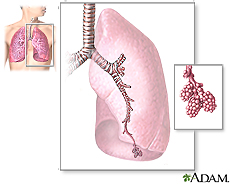
Legionnaires' Disease
Also called: Legionellosis
Legionnaires' disease is a type of pneumonia caused by bacteria. You usually get it by breathing in mist from water that contains the bacteria. The mist may come from hot tubs, showers or air-conditioning units for large buildings. The bacteria don't spread from person to person.
Symptoms of Legionnaires' disease include fever, chills, a cough and sometimes muscle aches and headaches. Other types of pneumonia have similar symptoms. You will probably need a chest x-ray to diagnose the pneumonia. Lab tests can detect the specific bacteria that cause Legionnaires' disease.
The bacteria are more likely to make you sick if you
- Are older than 65
- Smoke
- Have a lung disease
- Have a weak immune system
Legionnaires' disease is serious and can be life-threatening. However, most people recover with antibiotic treatment.







